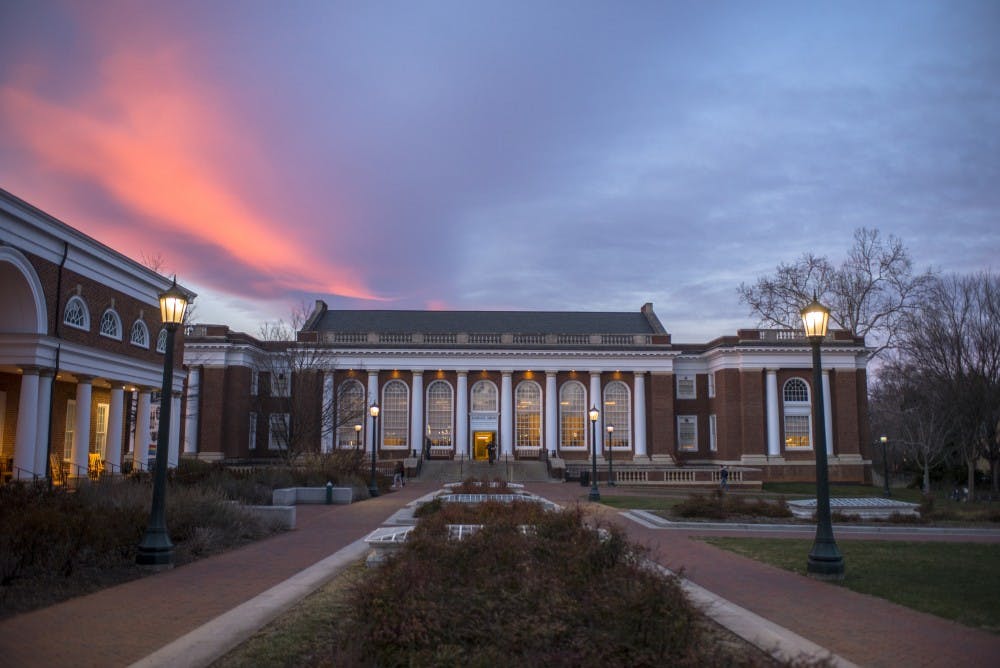As students, we often overlook the extent to which Charlottesville’s landscape impacts our personal experiences at the University. In simple ways, the main attractions of Grounds facilitate how we move through spaces — the Lawn, the Academical Village and the Rotunda all influence our personal mobility. However, these landscapes also indicate how the University commemorates its past and by extension which people and ideals it endorses. Memorials, monuments and building names function to preserve legacies of the past. While memorialization can be a net positive for our community, such as the University’s in-progress Memorial to Enslaved Laborers, other memorials can be damaging.
Alderman Library’s name in and of itself represents a toxic memorialization of a University president who endorsed and sought to spread ideas of eugenics and other forms of violence against people of color. With the Bicentennial celebrating 200 years at the University, we should choose to remold our landscape to celebrate members of our institution who have showcased excellence and demonstrated inclusivity to all members of the community. Alderman Library’s renaming is long overdue and must occur in order to fulfill the University’s new vision.
While President Edwin A. Alderman holds a checkered past, his supporters may point to some select highlights of his career. Alderman did advocate for universal education in South, and some may argue that Alderman also tried to advance women’s education, pointing to his quote that he believed that “forgotten women” represented a gross failure of the education system. The reality of both of these statements reveals the tension between Alderman’s words and his actions.
However, in terms of enrollment, only two women matriculated at the College by 1924 under his watch and only 61 were enrolled at the graduate level in the same period of time. His promises to promote a separate women’s college died after both students and faculty voiced extreme opposition. Alderman was further kowtowed into inaction after the General Assembly made advocating for women’s education politically unfavorable, as the leading state politicians scoffed at the idea of formal women’s colleges.
President Alderman’s racial politics and promotion of eugenics, however, create the real stain on his reputation. The University became the standard bearer for the study of eugenics under his direction, echoed in his inauguration speech — he was committed to “the solemn obligations of racial integrity.” These racist sentiments manifested at the institution in a variety of ways. Alderman hired professors that hoped to establish a master race that traced its line back to white Jamestown settlers and the “Ancient Planters” in order to reaffirm a “pure” Old Virginia stock. Ivey Lewis, the chair of the Miller School of Biology and Agriculture, stated this even more bluntly saying, “We must reword the bold statement to read that all men are created equal only in the sense that all have a right to equality of opportunity and equality before the law. Actually all men are created unequal in their hereditary equipment and potentialities, in their natures.”
The ramifications of the University’s eugenics policies spread violence internationally. The passage of the Laughlin’s Model Law by the Virginia General Assembly, influenced by the University’s research and lobbied for by the Anglo-Saxon Club of Virginia, eventually became the inspiration for Nazi Germany’s sterilization projects. The University’s institutional endorsement of white supremacy unmistakably opened the door for further atrocities. For example, Virginia alumni were among the experimenters who conducted the Tuskegee syphilis study.
Enough time has passed for students, faculty and administration to realize that President Alderman’s tenure has left a stain on the University’s history. As long as we keep Alderman’s name connected to our most central research library, we openly endorse his track record at the University. We’ve already renamed a medical building from Jordan Hall to Pinn Hall in recognition that eugenicists like Harvey E. Jordan can no longer be celebrated — the same should be done with Alderman Library.
It isn’t accidental that our city attracted white supremacists on Aug. 11 and 12, 2017, because our landscape is pockmarked with endorsements of their ideology — these toxic ideals built into the brick and mortar of the University both reflect and project institutional endorsement of this racism. In a time where the student body rejects such ideas, it is unconscionable for Alderman’s name to be linked to one of our most prominent areas of scholarship.
During his tenure, Alderman accepted a $1,000 donation from the KKK for the creation of new gymnasium. At the same time in 1921, the KKK felt emboldened to burn crosses at Thomas Jefferson’s grave site at Monticello, understanding President Alderman’s endorsement of their cause. As a thank you for the KKK’s generosity, Alderman wrote back to the organization that he was “faithfully yours.”
We, the student body, are no longer “faithfully yours” President Alderman. It’s time to remove his name from the library.
Katherine Smith is a Senior Opinion Columnist for The Cavalier Daily. She can be reached k.smith@cavalierdaily.com.







